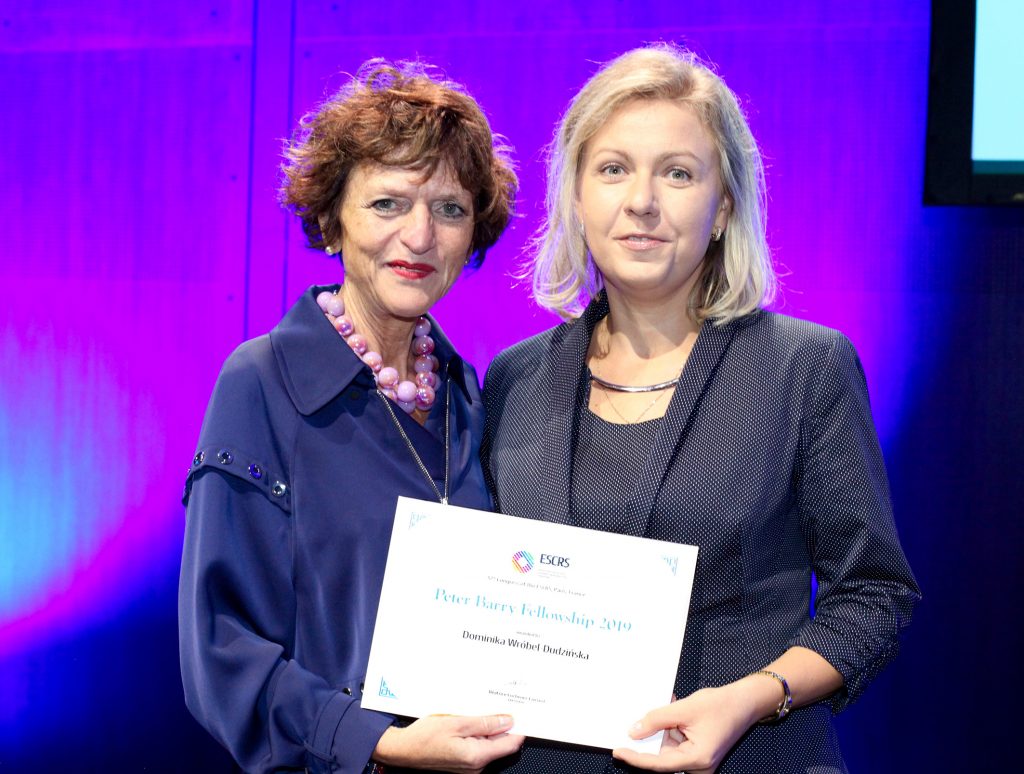Peter Barry Fellowship
Fellowship commemorates immense contribution made by the late Peter Barry to ophthalmology

Colin Kerr
Published: Friday, December 6, 2019
 Béatrice Cochener-Lamard presenting the Peter Barry Fellowship 2019 certificate to Dominika Wróbel-Dudzińska.[/caption]
Béatrice Cochener-Lamard presenting the Peter Barry Fellowship 2019 certificate to Dominika Wróbel-Dudzińska.[/caption]
The winner of the 2019 ESCRS Peter Barry Fellowship Grant was Dominika Wróbel-Dudzińska.
The Fellowship commemorates the immense contribution made by the late Peter Barry to ophthalmology and to the ESCRS.
The Fellowship of €60,000 is to allow a trainee to work abroad at a centre of excellence for clinical experience or research in the field of cataract and refractive surgery, anywhere in the world, for one year.
Dr Wróbel-Dudzińska, who works in the Department of Diagnostic and Microsurgery of Glaucoma in Lublin, Poland, received the Fellowship from ESCRS President Béatrice Cochener-Lamard at the Opening Ceremony of the ESCRS Congress.
“Being an ophthalmologist has been my dream since childhood but I began to think deeply about ophthalmology after Student Exchange Scholarship in the Ophthalmology Department at the Federal University of Santa Catarina in Florianopolis, Brazil; in 2007,” said Dr Wróbel-Dudzińska.
“In 2010 I started my ophthalmology residency and a postgraduate programme at the Medical University of Lublin. Since that time, I have been giving lectures and classes in Polish and English with medical students at the Medical University of Lublin,” she said. “Moreover, I conducted clinical and scientific research to establish genetic risk factors in the occurrence of normal tension glaucoma, in contrast to open-angle glaucoma, that was the topic of my PhD dissertation.
“Nowadays, apart from working in the clinic, I additionally conduct scientific work: ‘Genes polymorphism’s affecting the structure and functions of corneal endothelial cells in patients with Fuchs’ dystrophy’ and ‘Efficacy of platelet-rich plasma in the treatment of ocular surface diseases’.
In 2013, Dr Wróbel-Dudzińska was selected as an SOE Observership grant recipient. She completed her fellowship in Vissum Corporacion Clinic in Alicante.
“I had a great time there, gaining the experience and practice, learning from the best. I was able not only to look at the procedures but also actively participate in some of the surgeries. This was the first place of my contact with refractive surgery,” she said.
“I am the type of person who has been open to new things including academic and challenging endeavours. I love to explore certain interest in the ophthalmology field as well as cataract and refractive surgery.”
Dr Wróbel-Dudzińska said that after receiving the fellowship she was eager to undertake various clinical duties to extend her knowledge in diagnosing, evaluating and managing patients with various ophthalmology disorders. “I expect this fellowship will provide me with the experience needed to become a comprehensive ophthalmology specialist and help me to achieve my career goals, moreover to broaden my research experience,” she concluded.